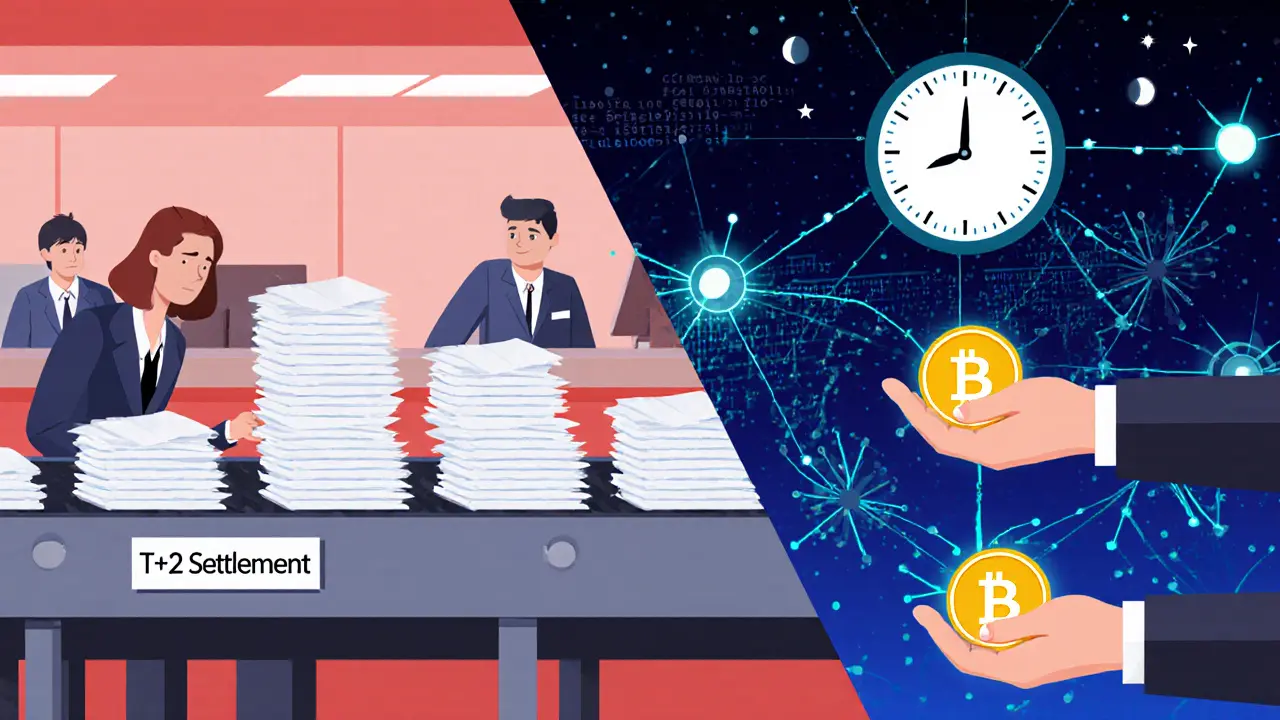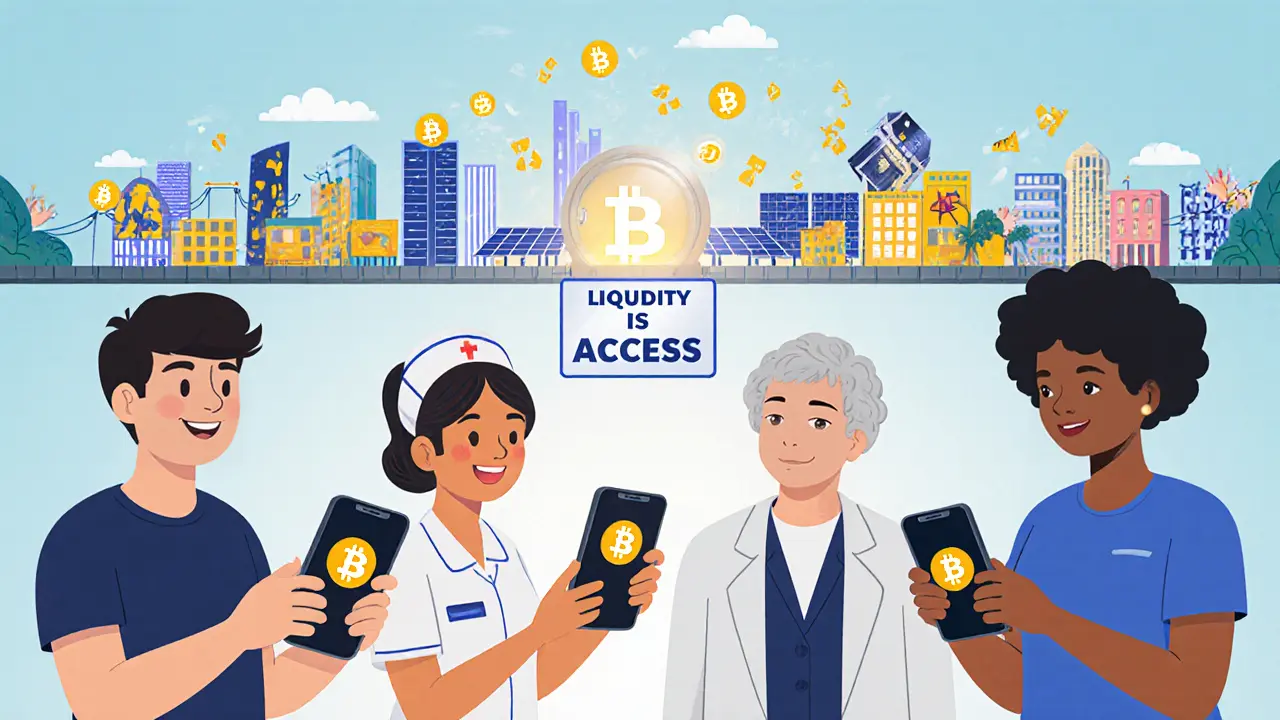Security Token Liquidity Comparison Tool
Compare Liquidity Metrics
See how security tokens compare to traditional securities across key liquidity metrics based on 2023-2024 real-world data.
Compare both investment types to see liquidity differences
Imagine buying a share of a Manhattan skyscraper for $500 instead of $5 million. That’s not science fiction-it’s what happens when real estate becomes a security token. Unlike traditional stocks or bonds, these digital assets don’t just represent ownership-they’re coded to trade 24/7, settle in seconds, and open doors for everyday investors. But how does their liquidity really compare to the old system? And is it as smooth as it sounds?
What Makes Security Tokens Different?
Security tokens are digital representations of real-world assets-like real estate, private equity, or art-that follow securities laws. They’re not like Bitcoin or Ethereum, which are cryptocurrencies. They’re regulated. That means they must comply with the Securities Act of 1933 and the Securities Exchange Act of 1934 in the U.S. They’re issued through Security Token Offerings (STOs), not ICOs, which means there’s real legal oversight. The magic isn’t just in regulation-it’s in the code. Smart contracts handle everything: who can buy, who can sell, how much can be traded, and when payments are made. No brokers. No paperwork delays. No manual reconciliation. The blockchain records every transaction instantly and permanently. This isn’t theoretical. In 2024, tokenized real estate platforms in the U.S. and Europe reported that properties listed on blockchain exchanges traded 8.6% more frequently than those kept on traditional ledgers. Even after market adjustments, that advantage held at 3.8%. That’s not a small bump-it’s a structural shift.Traditional Securities: The Bottlenecks
Traditional stocks and bonds operate inside a system built for the 20th century. Trading hours? Limited to 9:30 a.m. to 4 p.m. Eastern Time on weekdays. Settlement? Takes two to three days (T+2), meaning your money isn’t yours until the paperwork clears. Fees? Brokers, transfer agents, custodians, clearinghouses-all take cuts. And if you’re not an accredited investor, your access to private equity, venture capital, or commercial real estate is basically zero. A $10 million office building? You need to write a check for millions. Or you wait years for a REIT to list shares on the public market. Either way, you’re locked in. Liquidity here isn’t about speed-it’s about access. And access is tightly controlled. Even when you can trade, it’s slow. If you sell 100 shares of Apple, it doesn’t mean you get cash instantly. The trade has to go through the NSCC, the DTCC, and a dozen other middlemen before the money hits your account. All that takes time. And money.How Security Tokens Unlock Liquidity
Security tokens break those bottlenecks in four key ways:- 24/7 Trading: No market hours. You can trade on weekends, holidays, or at 3 a.m. if you want. Global buyers and sellers connect directly.
- Instant Settlement: Transactions settle in minutes-or even seconds-because the blockchain does the clearing automatically. No T+2 delays.
- Fractional Ownership: A $5 million hotel can be split into 5 million tokens. You buy 100 tokens for $100. That’s impossible with traditional shares.
- Lower Costs: No brokers. No transfer agents. No manual reconciliation. Smart contracts cut out the middlemen, slashing fees by 60-80% in many cases.

Real-World Liquidity Numbers
Let’s look at actual data. In 2023, a study of tokenized real estate on regulated platforms like Securitize and Polymarket showed:- Monthly turnover: 5% on average (up from 1% before tokenization)
- Annual turnover: 60% (compared to 15% for traditional private real estate funds)
- Buyer participation: 73% of buyers were retail investors (under $1 million net worth)
- Transaction time: Under 5 minutes from trade to settlement
Why Isn’t Everyone Using Security Tokens Yet?
The tech works. The demand is there. So why aren’t security tokens dominating the market? First, regulation is still patchy. The U.S. SEC is watching closely. The EU has MiCA. Singapore and Switzerland are ahead. But in many countries, the rules are unclear. Platforms can’t operate globally without risking fines. Second, the infrastructure isn’t perfect. Gas fees on Ethereum can spike during high volume. If you’re trading $1,000 worth of tokens and pay $150 in gas, it’s not worth it. That’s why many platforms are moving to Layer 2 solutions like Polygon or using private blockchains like Hedera or Algorand. Third, user experience is still clunky. You need a wallet. You need to manage private keys. You need to verify your identity (KYC/AML). For someone used to Robinhood, that’s a barrier. And then there’s trust. People still worry about hacks. Smart contracts have bugs. In 2024, a tokenized bond platform in Germany had a vulnerability that allowed one user to drain $2.3 million before it was patched. That’s rare-but it happened.Who Benefits the Most?
Not everyone. But some groups win big:- Small investors: Now you can own a piece of a commercial building, a private startup, or a music royalty stream without needing a fortune.
- Asset owners: Real estate developers, private equity firms, and artists can raise capital faster, cheaper, and from a global pool.
- Traders: Arbitrage opportunities between tokenized assets and their traditional counterparts are growing. Some hedge funds now run dual strategies: long on traditional, short on tokenized, or vice versa.

The Future: Integration with DeFi
The real game-changer isn’t just trading tokens-it’s using them in DeFi. Tokenized securities can now be used as collateral for loans on platforms like Aave or Compound. You can stake them for yield. You can lend them. You can swap them for other assets on decentralized exchanges. This is the future of finance: modular, open, and global. A U.S.-based hedge fund started using tokenized corporate bonds as collateral in 2024. They borrowed $12 million in stablecoins against them, earning 4% yield on the bonds while using the cash to buy other assets. That’s impossible with traditional bonds-you can’t pledge them as collateral on a DeFi protocol. This integration is what makes security tokens more than just digital stocks. They’re building blocks for a new financial system.How to Get Started
If you want to try security tokens, here’s how:- Choose a regulated platform: Look for ones registered with the SEC (like Securitize, Harbor, or tZERO) or compliant with MiCA in Europe.
- Set up a wallet: MetaMask or Coinbase Wallet work. Make sure you backup your seed phrase.
- Complete KYC: Upload ID, proof of address, and answer questions about your investor status.
- Buy tokens: Start small. Pick one asset class-real estate, private equity, or debt-and test the waters.
- Track taxes: Token trades are taxable events. Keep records of every purchase and sale.
Final Thought: Liquidity Isn’t Just Speed-It’s Access
The biggest advantage of security tokens isn’t faster trades or lower fees. It’s that they make markets open to everyone. Not just the rich. Not just the connected. Anyone with a smartphone and internet can participate. Traditional securities were designed for institutions. Security tokens are designed for people. That’s why liquidity here isn’t just about how fast you can sell. It’s about whether you could sell at all.Are security tokens the same as cryptocurrencies like Bitcoin?
No. Bitcoin and Ethereum are cryptocurrencies-they’re digital currencies designed as money or store of value. Security tokens represent ownership in real-world assets like real estate, stocks, or bonds, and are regulated under securities laws. They’re not meant to be speculative currencies-they’re investment instruments with legal rights attached.
Can I trade security tokens anytime, even on weekends?
Yes. Unlike traditional stock markets that close on weekends and holidays, security tokens trade 24/7 on blockchain-based platforms. As long as the platform is operational and you’re in a jurisdiction that allows it, you can buy or sell at any time. However, settlement speed can vary depending on the blockchain used-some networks are faster than others.
Do I need to be an accredited investor to buy security tokens?
It depends. Some security tokens are offered under Regulation D and are only available to accredited investors (those with $1M+ net worth or $200K+ income). But others are offered under Regulation A+ or Regulation CF, which allow non-accredited investors to participate with limits. Always check the offering’s prospectus before investing.
What happens if the platform I bought tokens on shuts down?
Your tokens are stored on the blockchain, not on the platform. Even if the platform goes offline, you still own the tokens as long as you control your private keys. You can move them to another wallet or use a different exchange that supports the same token standard. However, liquidity may drop if no other platforms list the token, making it harder to sell.
Are security tokens taxed differently than traditional stocks?
In the U.S., the IRS treats security tokens as property, just like traditional stocks. Capital gains taxes apply when you sell or trade them. However, every trade-even swapping one token for another-is a taxable event. This makes record-keeping more complex than with traditional brokerage accounts. Use crypto tax software like Koinly or TokenTax to track your transactions.



Brian Gillespie
This is actually life-changing for small investors.
Kylie Stavinoha
It’s fascinating how technology is rewriting the social contract of ownership. For centuries, wealth was gatekept by capital, geography, and connections. Now, a single line of code can dissolve those barriers. Is this the end of financial elitism-or just a new kind of exclusivity disguised as openness? The blockchain doesn’t care who you are, but the humans behind the platforms still do.
And yet… isn’t it ironic that the most democratizing force in finance still requires KYC, legal compliance, and identity verification? The system wants to be open, but it’s afraid of chaos. So it builds walls with digital ID cards.
Diana Dodu
U.S. regulations are the only real framework that matters. If you're not SEC-compliant, you're just gambling with code. Europe? Too slow. Asia? Too chaotic. This is AMERICA'S innovation-and we're letting it slip away because people are too scared to regulate it right.
Stop crying about gas fees. Use Polygon. Stop whining about wallets. Learn how to use MetaMask. If you can't handle it, stay out of the future. We don't need more hand-holding-we need more grit.
Raymond Day
Okay, so let me get this straight-you’re telling me I can now OWN A SKYSCRAPER FOR $500??? 😱
And you’re not even joking?!!
Meanwhile, my cousin in Ohio just got audited because he sold his NFT ape for $12K and didn’t report it. So now he owes $8K in taxes and still doesn’t know what a private key is.
THIS IS A TRAINWRECK. A BEAUTIFUL, GLORIOUS, CHAOTIC TRAINWRECK. 🚂💥
Who’s gonna be the first person to get scammed out of their $500 skyscraper share? I’m putting money on it happening before Q3.
Noriko Yashiro
Really fascinating stuff-though I think the UK needs to catch up on this. We’ve got the legal infrastructure, but the culture is still too cautious. People here still think ‘digital assets’ means Bitcoin for gamblers.
But the potential? Massive. Imagine a London flat being split into 10,000 tokens-each worth £50. A student could buy one. A retiree could buy ten. No estate agent. No lawyer. Just… ownership.
It’s not magic. It’s just… better.
Andy Purvis
I like how this shifts power from institutions to individuals. Even if the tech isn't perfect yet, the direction is right. We're moving away from gatekeepers and toward direct participation. That’s a good thing, even if it’s messy.
Let’s not throw out the baby with the bathwater just because some platforms suck or people get hacked. The solution isn’t to stop-it’s to improve.
Michael Faggard
Let’s be clear: security tokens are not ‘digital stocks.’ They’re programmable securities with embedded compliance logic-ST-20, ERC-1400, etc.-on permissioned or hybrid blockchains. The liquidity gains come from atomic settlement, automated KYC/AML gating, and fractionalization via smart contracts. This isn’t DeFi 1.0-it’s TradFi 3.0.
And yes, gas fees are still a problem on Ethereum L1, but Layer 2s like Polygon zkEVM and Arbitrum are cutting costs by 99%. Hedera’s consensus model is even faster-sub-second finality with zero gas. If you’re still using ETH mainnet for tokenized assets, you’re doing it wrong.
Also, don’t confuse this with NFTs. Security tokens have fungibility, regulatory compliance, and dividend distribution baked in. They’re not collectibles-they’re capital instruments.
Elizabeth Stavitzke
Oh wow, so now even my Uber driver can ‘invest’ in a Manhattan skyscraper? How noble.
Let me guess-next they’ll let toddlers buy private equity. ‘Daddy, I used my allowance to buy 0.003% of a Walmart!’
It’s cute. It’s also a regulatory nightmare wrapped in a blockchain glitter bomb. The SEC isn’t just watching-they’re preparing subpoenas.
And don’t get me started on ‘24/7 trading.’ You think retail investors can actually analyze a REIT’s lease expirations at 3 a.m.? No. They’re just FOMO-ing into a token that’s 80% vaporware.
Real liquidity? That’s when institutions trade. Not when some guy in Nebraska clicks ‘buy’ because he saw a TikTok.
Ainsley Ross
This is one of the most hopeful developments in finance I’ve seen in decades.
I remember when I tried to invest in a small commercial property back in 2015. I needed $250K minimum. I had to sign 47 pages of documents. The fund manager took 2 years to even respond to my email. And when I finally got in? I couldn’t sell for 7 years.
Now? My neighbor-a single mom who works two jobs-bought $150 worth of tokens tied to a solar farm. She got her first dividend payment in 3 weeks. She cried. I cried.
This isn’t just about money. It’s about dignity. It’s about saying: you belong here, too.
Let’s not let bad UX or the occasional hack scare us away from something this transformative.
And yes, I use MetaMask. And yes, I backup my seed phrase. And yes, I pay my taxes. We can do this right.
❤️
Wayne Dave Arceo
Incorrect. Security tokens are not inherently more liquid than traditional securities. Liquidity is determined by market depth, not settlement speed. A tokenized asset with 12 buyers and 3 sellers is less liquid than a public stock with 100,000 daily trades.
The 5% monthly turnover statistic is misleading-it’s based on a tiny, self-selected sample of early adopters on niche platforms. The broader private markets still have negligible liquidity. And 73% retail participation? That’s not a feature-it’s a red flag. Retail investors lack the due diligence capacity to value complex assets like private equity or commercial real estate.
Also, smart contracts are not immune to bugs. The German bond hack was not ‘rare.’ It was inevitable. And the IRS treats every token swap as a taxable event? That’s correct-but nobody’s talking about the administrative nightmare this creates. You need to track every micro-transaction. That’s not innovation. That’s compliance hell.
Joanne Lee
I appreciate the depth of this analysis. One thing I’m curious about-how do you see the role of custodians evolving? Right now, platforms like Securitize act as both issuer and custodian. But if tokenized assets become mainstream, won’t we need independent, regulated custodians who can hold the private keys securely, separate from the trading interface?
Also, what happens when a tokenized asset’s underlying property is sold? Does the smart contract automatically update ownership, or is there still a manual reconciliation step? I’d love to see more detail on the back-end governance mechanics.
Laura Hall
Okay so I just bought my first tokenized asset-$200 in a Brooklyn coffee shop. 🤯
It was kinda scary at first-wallet, seed phrase, KYC, all that jazz. But the platform had a video tutorial and a chatbot that actually answered me in under 5 mins. I got my tokens in 2 minutes. I can sell them tomorrow if I want.
And guess what? I feel like I’m part of something. Like I’m not just a consumer-I’m an owner. Even if it’s just 0.0002% of a latte machine.
To everyone saying ‘this is too complicated’-it’s not. It’s just different. And different is scary. But so was the internet in 1995.
Try it. Start small. Don’t overthink it. You got this. 💪
Also, I spelled ‘token’ wrong in my first transaction. Oops. 😅
Arthur Crone
Everyone’s acting like this is the future. It’s not. It’s a Ponzi scheme with better branding.
You think retail investors understand asset-backed securities? They don’t even understand dividends. They buy because they saw a meme.
The ‘60% annual turnover’? That’s because people are flipping tokens like baseball cards. Not investing. Gambling.
And when the market turns? When the next crypto winter hits? All those ‘fractional skyscrapers’ will be worth zero. Because they were never real assets-they were hype wrapped in code.
Wake up. This isn’t finance. It’s casino capitalism.
Michael Heitzer
This is the quiet revolution. Not in boardrooms. Not in Wall Street. But in bedrooms. In dorm rooms. In small towns where people never thought they’d own anything beyond their car.
Think about it: for the first time in human history, you don’t need to be born rich to own a piece of the world’s wealth. A farmer in Iowa can own part of a wind farm in Texas. A teacher in Detroit can earn yield from a tokenized bond issued by a hospital in Chicago.
It’s not perfect. The UX is clunky. The regulations are messy. But the principle? Pure. Access. Ownership. Agency.
And that’s why this will win. Not because it’s faster. Not because it’s cheaper. But because it’s fairer.
And fairness? That’s the most powerful force in finance.
Rebecca Saffle
So now everyone gets to play in the big leagues? Cute.
Meanwhile, the people who actually built these assets-the developers, the lawyers, the investors who took the risk for 10 years-get diluted by 10,000 micro-investors who think they’re ‘building wealth’ by buying $100 of a parking garage token.
And when the asset underperforms? Who’s going to be the one screaming on Reddit? The person who put in $2M? Or the person who bought 50 tokens and now thinks they’re entitled to a 50% return?
This isn’t democratization. It’s emotional ownership. And it’s going to blow up in our faces.
Adrian Bailey
Man, I’ve been reading up on this for weeks now. It’s wild. I mean, I used to think ‘blockchain’ was just for crypto bros who bought Dogecoin because Elon tweeted it. But this? This is different.
I tried buying a tokenized piece of a warehouse in Ohio-$75. Took me 20 minutes to set up my wallet, but the platform walked me through it. KYC was annoying but not impossible. I got my tokens, and I got an email saying I’d get a quarterly payout. No broker. No paperwork.
And honestly? It felt… normal. Like buying a stock on Robinhood. But better.
Yeah, there are risks. Yeah, the tech isn’t perfect. But I think this is the future. And I’m kinda proud to be part of it, even if I’m just a tiny piece.
Also, I misspelled ‘smart contract’ as ‘smat contrct’ in my first transaction. Oops. 😅
Rachel Everson
Start small. Seriously. Don’t go all-in on a $50K tokenized real estate fund. Try $50 on a local business or a solar project. Get used to the flow. Learn how the wallet works. Check your taxes. Talk to people in the community.
This isn’t a get-rich-quick scheme. It’s a get-involved scheme.
And if you’re scared? That’s okay. I was too. But I’m glad I tried. Now I feel like I actually understand how money works. Not just how to spend it-how to own it.
Johanna Lesmayoux lamare
Interesting. I’m still not sure I trust the platforms. But the concept? Makes sense.
Elizabeth Stavitzke
Wow, you really think a teacher in Detroit can value a commercial real estate asset better than a fund manager with 20 years of experience? That’s not empowerment-that’s delusion.
And ‘fairness’? The market doesn’t care about fairness. It cares about information, capital, and risk appetite.
You’re romanticizing chaos.
Michael Heitzer
Maybe. But fairness isn’t about being better at math. It’s about being allowed to play the game at all.
For 100 years, the game was rigged. Only the rich got to sit at the table. Now? A teacher can buy a seat. Even if she doesn’t know all the rules yet.
Let her learn. Let her fail. Let her win.
That’s the point.
Adrian Bailey
Also, I just sold my Ohio warehouse token for a 12% profit. I didn’t cry. I didn’t celebrate. I just… felt good. Like I did something real. Not because I made money. But because I was part of it.
And yeah, I still misspell ‘smart contract.’ But now I know what it means.
That’s enough for now.